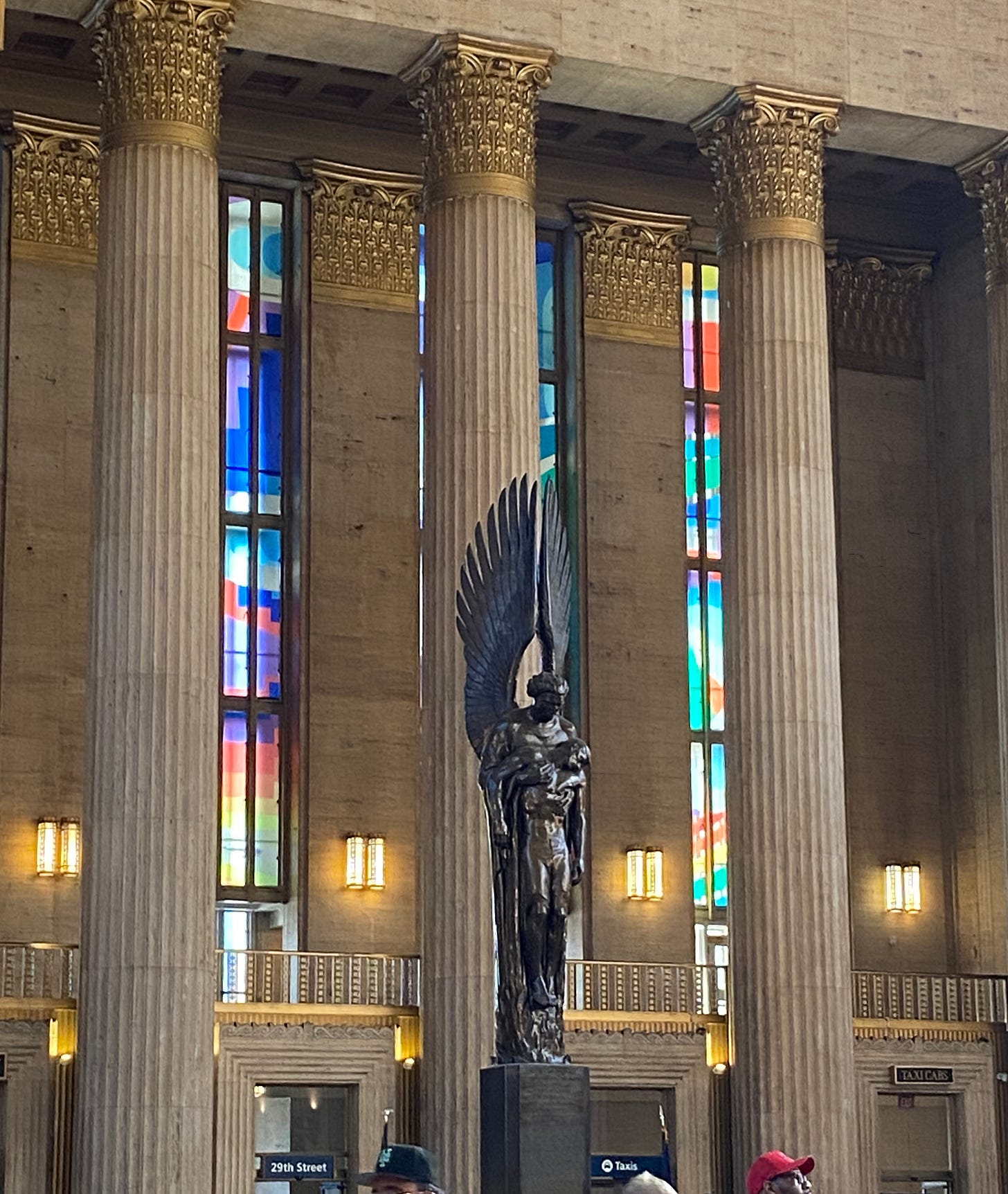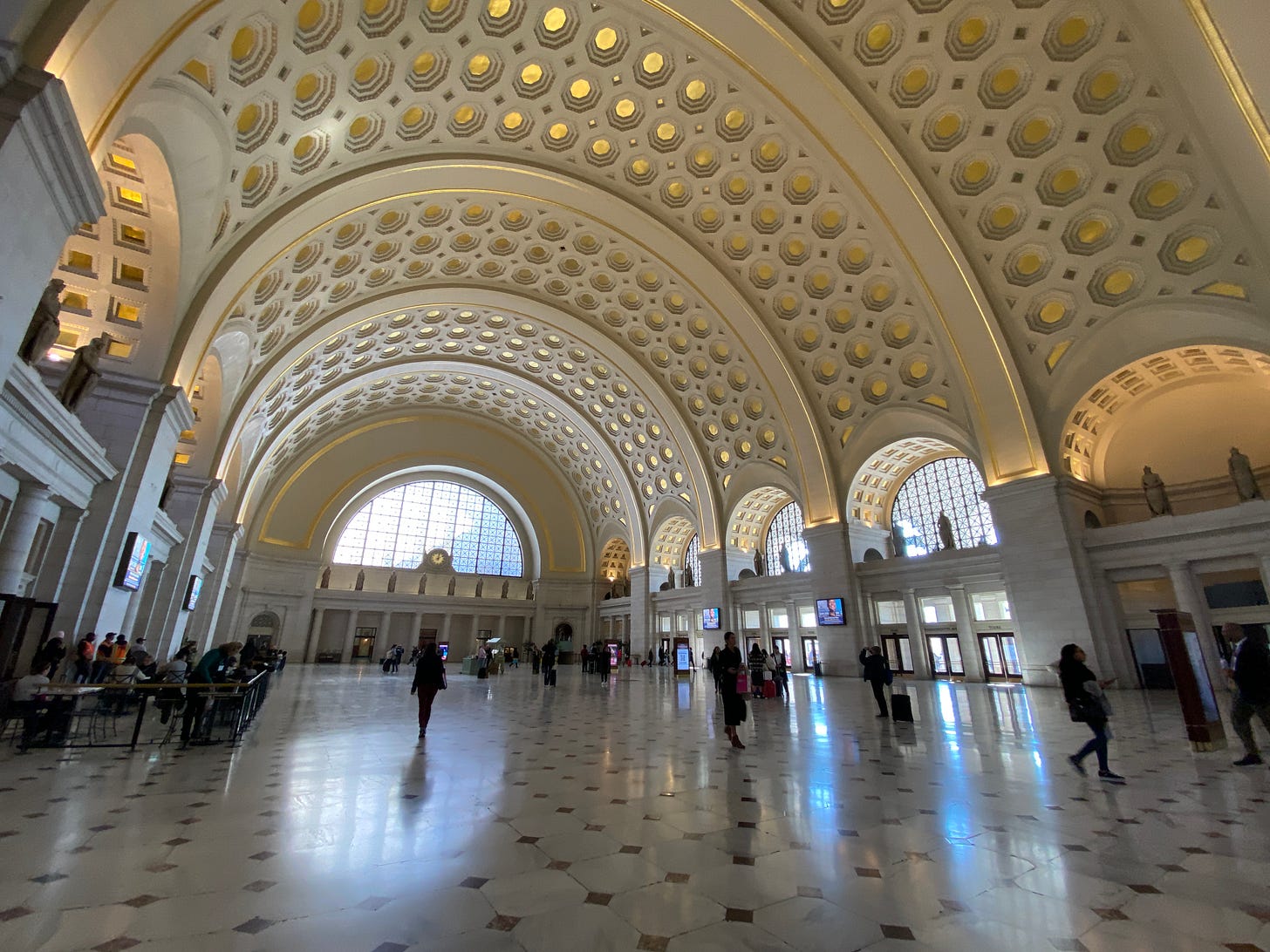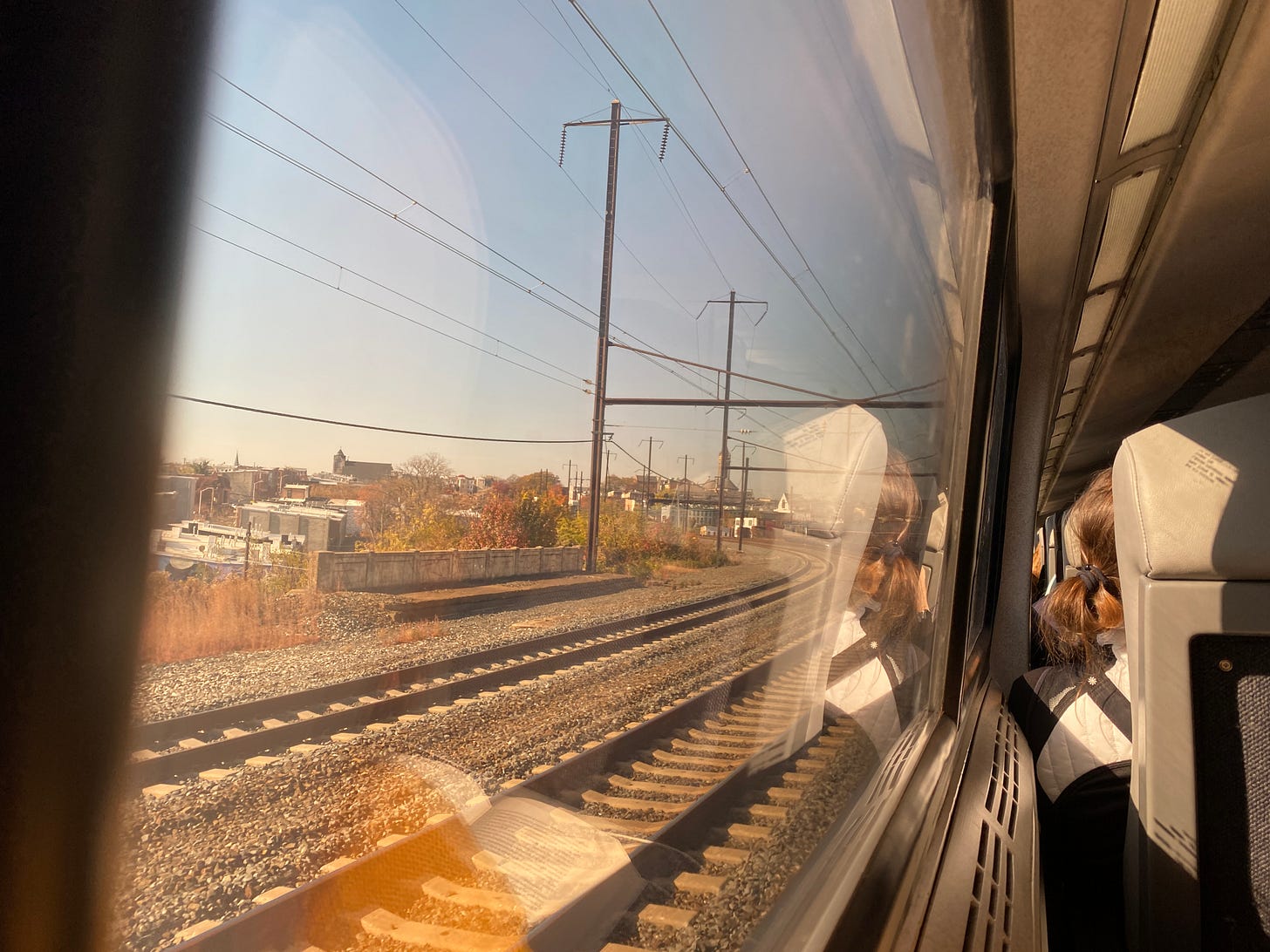Advent Reflections: Waiting at 30th Street Station
Learning to trust God's timing with Lucy Pevensie and St. Peter
There’s something so delightful about train travel. Maybe it’s because of my many fond memories of traveling by rail in Europe and the UK, but I always wish I had more opportunities to take the train. So it was a treat when the fates recently aligned, and I found myself with an upcoming rail journey.
I arrived at 30th Street Station early, and, on top of that, my train was delayed, so I had quite awhile to wait. For most of that interval, my train wasn’t listed on the departures board, and, when it finally appeared, there was no platform number displayed until just before boarding began.
But I wasn’t worried. It was a pleasure to have several extra hours to sit in the beautiful concourse, to sip some coffee and get some work done on my laptop, to admire the soaring windows and coffered ceiling, to pay my respects to the St Michael the Archangel statue, to watch the interesting crowds come and go and speculate about their journeys, to enjoy the exciting-sounding names of the other trains - the Silverliner, the Carolinian, the Palmetto, the Keystone.

It didn’t concern me that other passengers were boarding and departing on time. They had their trains; I had mine. I ignored the small, irrational worry at the back of my mind that I had somehow missed the announcement of the platform and missed my departure. I was enjoying my wait in the beautiful station. I knew that when it was time to go, I would know where to go.
Standing in the woods of Narnia in C.S. Lewis’ Prince Caspian, Lucy Pevensie waits not on a train but on a word:
“Oh Trees, Trees, Trees,” said Lucy (though she had not been intending to speak at all). “Oh Trees, wake, wake, wake. Don’t you remember it? Don’t you remember me? Dryads and Hamadryads, come out, come to me.”
Though there was not a breath of wind they all stirred about her. The rustling noise of the leaves was almost like words. The nightingale stopped singing as if to listen to it. Lucy felt that at any moment she would begin to understand what the trees were trying to say. But the moment did not come. The rustling died away. The nightingale resumed its song. Even in the moonlight the wood looked more ordinary again. Yet Lucy had the feeling (as you sometimes have when you are trying to remember a name or a date and almost get it, but it vanishes before you really do) that she had just missed something: as if she had spoken to the trees a split second too soon or a split second too late, or used all the right words except one, or put in one word that was just wrong.
The scene reminds me a little of Peter (St. Peter rather than Peter Pevensie!) during the Transfiguration, when he went up the mountain and saw Christ with Moses and Elijah. I love his eagerness in that moment - he’s all ready to jump into action and build three tents - but the time wasn’t quite right. The moment doesn’t come. The tents don’t get built. Peter goes back down the mountain and gets back to work.
Peter later denies Christ three times, and it is so perilously easy, even when you have been blessed with moments of vision like St. Peter and Lucy, to deny that they meant anything. You wonder if it was all just an illusion. You wonder if, after all, the moment for fulfiment has already come and gone, and somehow you didn’t know the word you were supposed to know. Maybe the word was withheld from you, and the vision was just a cruel tease. Or maybe the word was right in front of you, and you ought to have been able to see and speak it, but you just failed. The opportunity is gone, and that’s it. The chance is past.
But St Thérèse of Lisieux wrote, “God cannot inspire unrealizable desires.” Lewis’ friend Tolkien wrote of his God-figure, Ilúvatar, in The Silmarillion: “He does not plant to no purpose.” Here’s how Eleanor Farjeon put it in my favorite Advent hymn, “People, Look East.”
Furrows, be glad. Though earth is bare,
One more seed is planted there:
Give up your strength the seed to nourish,
That in course the flower may flourish.
People, look east and sing today:
Love, the rose, is on the way.
Birds, though you long have ceased to build,
Guard the nest that must be filled.
Even the hour when wings are frozen
God for fledging time has chosen.
People, look east and sing today:
Love, the bird, is on the way.
As I know from my experience gardening, sometimes seeds take a long time to come up. Sometimes trains get delayed. But every spring, flowers do flourish and nests get filled. Trains do eventually depart, and passengers reach their destinations. Sometimes you just have to wait for the right moment to arrive.
We are now in the midst of Advent, which is a season of waiting. While I was enjoying my peaceful interlude at 30th Street Station, I thought that I ought to take that positive attitude and channel it into other seasons of waiting. Too often, I hear the whisper on the wind of some future departure in my life, and when the days pass and the months pass and the years pass and I still can’t find any sign of the right platform, I get dejected. I’m tempted to think I’ve missed the train that would have taken me where I needed to go — but God doesn’t work like that. If you’re trying to watch His departures board, He won’t let you miss a train that truly has your name on it. As soon as you turn to Him, He’ll move Heaven and Earth to get you where you need to be when you need to be there. He can even fill the waiting, however long and dark it feels, with meaning and beauty.
Bitterness and discouragement are much easier to keep at bay when you actively look for and notice the soaring structures around you, when you buckle down to the tasks God puts in your hands, however humble they may seem, however long you have to keep at them. If God has left you with extra time at the station, waiting on a word that hasn’t been spoken yet, you have a blessed opportunity to strive to wait well, to build spiritual muscle, to hone and strengthen that faith and love which is the whole goal of human existence. You’re not really waiting for a word; you’re waiting for the Word.
I like to think that when St. Peter got to heaven, Christ, Moses, and Elijah were all there to greet him, and Christ showed him the whole tapestry of the Church stretching through human history and said, “My dear friend, you have built much more durable tents than anything you could have constructed that day on the mountain.”
We can’t really know what a promised vision means in this earthly life, and we only get the vision when we leave the timing to God. My train will come. My moment will come. My word will be spoken — by God, not me.
The light was changing. Low down in the east, Aravir, the morning star of Narnia, gleamed like a little moon. Aslan, who seemed larger than before, lifted his head, shook his mane, and roared.
The sound, deep and throbbing at first like an organ, beginning on a low note, rose and became louder, and then far louder again, till the earth and air were shaking with it. It rose up from that hill and floated across all Narnia…
What Lucy and Susan saw was a dark something coming to them from almost every direction across the hills. It looked first like a black mist creeping on the ground, then like the stormy waves of a Black Sea rising higher and higher as it came on, and then, at last, like what it was - woods on the move. All the trees of the world appeared to be rushing towards Aslan.





This was beautiful to read, and such a timely message! I've always enjoyed Eleanor Farjeon's writing but somehow I've never come across People, Look East before, which was lovely to read and listen to.
What a lovely way of looking at things! And the grander train stations always have such a thoughtful use of light, they were made for a comfortable delay. I'm wondering if you've ever read Henri Nouwen's "A Spirituality of Waiting"?